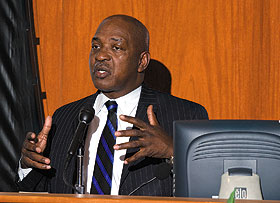  |
| HOME | THIS ISSUE | CALENDAR | GRANTS | BACK ISSUES | < BACK | NEXT > |
Expert on race and law says Constitution flawed by Sherry Fisher - September 22, 2008 |
||||
| The United States Constitution should be celebrated, but its flaws must not be ignored, says internationally known legal theorist Charles J. Ogletree Jr. Ogletree made his remarks Sept. 17 in the Thomas J. Dodd Research Center’s Konover Auditorium. His presentation, “From Slavery to Freedom? Reflections on Race Relations in America,” was part of the University’s celebration of Constitution Day. Ogletree, a civil rights attorney and professor at the Harvard School of Law, is the author or co-author of several books on topics connected with race. He also serves as co-chair of the Reparations Coordinating Committee, a group researching a lawsuit based upon a claim of reparations for descendants of African slaves. “The Constitution is an impressive document, but deeply flawed from the beginning, because it did not address the issue of race,” Ogletree said. In 1787, when the founding fathers of the nation used the words of the preamble of the Constitution, ‘We the people ...,’ they did not have in mind the majority of Americans,” Ogletree said. The Supreme Court’s decision in Dred Scott v. Sandford in 1857 found even free slaves ineligible for U.S. citizenship, he said, noting that Chief Justice Roger Taney said Scott would never have rights because he was from Africa. “His chilling line was, ‘negroes are so inferior that they have no rights which whites are bound to respect,’” said Ogletree. Even after the 13th, 14th and 15th amendments were added to the Constitution, Blacks were still marginalized, Ogletree said. Poll taxes, grandfather clauses, and literacy tests that had nothing to do with voting precluded people from exercising their right to vote. He said that years later, when his pastor tried to vote while living in the South, he was asked to guess how many marbles were in a jar.
“That’s part of the challenge,” Ogletree said. “We have a Constitution that talked about embracing everyone, but it did not.” He added, “Racial gerrymandering and Jim Crow Laws were designed to say, ‘you’re no longer slaves, you have fundamental rights, but you’re still second-class citizens in terms of the law, policies, and practices.’” Ogletree said that in 1954, after Brown v. Board of Education, there were violent racial attacks that undermined the ideal of equal education for all in America. “But what we forget, and what we really aren’t taught, is what happened after the court said ‘equal education for all,’” he said, noting that there has been a lack of progress toward this ideal. “It is particularly troubling when you talk to young African American people in urban high schools today,” he said. “When they’re asked about the Civil Rights Movement, they’ll say there was slavery, there was Jim Crow segregation, there was Dr. King and he had a dream. It tells you how much of the rich, tortured history is lost.” A year after the Brown decision, for example, a youngster, Emmett Till, was lynched for whistling at a white woman, Ogletree said. That same year Rosa Parks was trying to ride the bus and was told to give up her seat. In 1964, in Philadelphia, Miss., three civil rights activists were murdered. Ogletree said Americans should live what the Pledge of Allegiance states: “One nation under God with liberty and justice for all. “That’s our challenge. That’s our task,” he said. “Let’s all make the American dream real for all children.” |
| ADVANCE HOME UCONN HOME |

